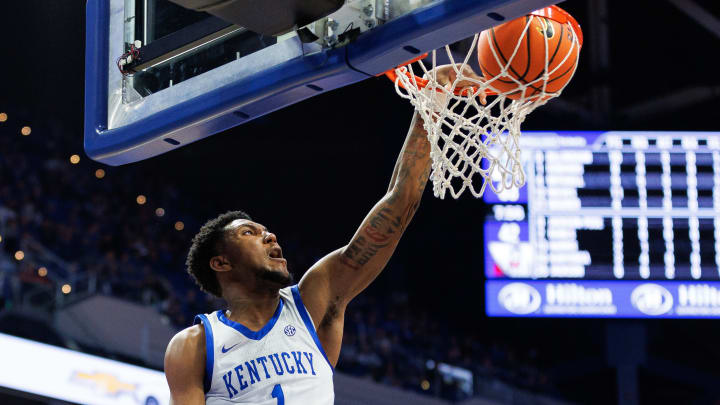What EA Sports College Football Means for a College Hoops Game

Last week, EA Sports outlined the payment structure for the upcoming release of their most anticipated title, College Football 25. After an eleven-year hiatus due to legal troubles, new NCAA policy allowing monetization of student-athlete Name, Image, and Likeness has opened the door for the recreation of the series - and this time the players receive a cut. With hysteria surrounding the game’s re-release, questions remain around the potential resurrection of another beloved, but less prominent title, EA Sports NCAA March Madness.
EA Sports NCAA March Madness had a thirteen-year run before ultimately being discontinued in 2009, four-years before the same fate was met by EA Sports NCAA Football franchise (now re-launched as EA Sports College Football). For over a decade, the NCAA March Madness title was a staple of EA Sports offerings, however, its demise was not attributed to the same legal concerns that plagued the college football franchise, but rather market preferences that did not make the game as profitable as its football counterpart. The final NCAA March Madness title sold a little over 150,000 copies; compared to the 1.5 million copies sold by NCAA Football 14, it was clear to EA Sports that a college basketball game was not a prudent business venture.
In the United States, football has always been the main sporting revenue generator, from franchise valuations to media rights deals, and in the instant case, video game sales. Separate industry giant 2K Sports marketed a similar college basketball product from 2002 – 2007. The 2K Sports ‘College Hoops’ franchise folded due to the same lack of interest shared by the EA Sports March Madness title.
Now, with a legal path forward, as evidenced by EA Sports College Football 25, could a college basketball game be a feasible investment for either EA Sports or 2K Sports. Without a college basketball title of any kind in fifteen years, an amount of intrigue and excitement would naturally follow the announcement of a new game.
With the new ability to license collegiate athletes' NIL, the novelty of being able to play as your favorite players would make the game a far better product than its predecessors. Basketball, as compared to football, needs to leverage individual personalities in order to thrive, not just the logo on the front of the jersey. If a college basketball game could utilize a similar college ambassador program as currently being executed for the College Football 25 game that highlights current elite college athletes, hype for this game could easily push interest in the franchise well beyond the level it was at during its final 2009 iteration.
When investigating the potential of a new title, an EA Sports Spokesperson gave little certainty either way about the possibility of a reboot: “We have nothing to announce about future titles at this time. We’re focused on delivering the most authentic college football experience possible when EA SPORTS College Football 25 launches this summer.” While in no way positive news, the company has not shut the door completely on relaunching the series.
So just how costly is a college basketball game to make in comparison to the highly lucrative college football title? The raw numbers could show indicate just how likely one of the gaming giants would be to dive back into college basketball.
EA Sports announced for its upcoming College Football title that each scholarship player at FBS institutions is eligible to opt in to be a playable character and in exchange for the licensing of their NIL will receive $600 and a complimentary copy of the game (value estimated at $70). There is an estimated 11,390 players eligible to be in the College Football 25 game (134 FBS schools with 85 scholarship players), assuming every athlete opts in, the money spent on player licensing will total roughly $7.63 million.
Historically, figures for the licensing of college basketball video games pale in comparison to that of the football title. Wonderful data below from Business of College Sports helps put a price tag on licensing fees. While no public data exists for the upcoming EA Sports College Football game licensing costs, data from the 2012-2013 academic year is helpful in establishing a starting point and serving as a proxy variable for total licensing costs.
· Louisville: “NCAA Football”: $85,845; “NCAA Basketball”: $26,594
· UCLA: “NCAA Football”: $57,230; “NCAA Basketball”: $26,593
· Clemson: “NCAA Football”: $85,845; “NCAA Basketball”: 18,616
· Wisconsin: “NCAA Football”: $143,076; “NCAA Basketball”: $26,593
· Texas A&M: “NCAA Football”: $57,000; “NCAA Basketball”: $18,615.80
While admittedly lacking the adequate data to be statistically significant, between these five Power 4 institutions, the mean licensing costs for the use of institutional IP in the basketball title was approximately 27% of what schools could command for licensing towards the college football video game. Upon first glance, this may read that a college basketball game cost only 27% of the college football game, however, it is imperative to remember that college football only has to account for the 134 FBS programs, the NCAA Basketball title would likely feature all 364 Division I programs eligible for the NCAA March Madness tournament.
Outside of well-established basketball powerhouses in the Big East -- and maybe the Atlantic 10 and West Coast Conference -- the majority of Mid-Major and Low-Major teams will be unable to command anywhere near the licensing figure of Power Four Schools. Absent historical data, it is challenging to put a price tag on the licensing fees from the 232 DI schools that are not a part of the FBS. Using the 2012-2013 data, if all 232 non FBS schools made half of the revenue on basketball licensing as their Power 4 and Group of 5 counterparts, a very generous estimate, the sum licensing spend for basketball licensing of all 364 DI programs would still fall short of the licensing cost of only the sixty-nine Power 4 programs football licensing at the roughly 4x estimated rate they are able to command. The cost of football licensing for the other sixty-five schools in the Group of 5 moves the licensing cost for institutional IP even further beyond that of a college basketball title.
In terms of player compensation, the college basketball game would once again come at a cheaper cost. Assuming the same structure as the college football title, DI basketball only has 13 scholarship players, totaling 4732 eligible players. If the payment figure is kept static ($670 total cost), the total spend on player compensation is reduced from $7.63 million to $3.17 million. Institutional licensing fees are likely an indication of player payment, so it would follow that college basketball players would not make the same as their football counterparts, once again reducing the total figure of compensation considerably. If payment is reduced to half of that offered to college football players ($300 and a copy of the game), once again a generous estimate, the total spend on athlete licensing is further reduced to 1.75 million, a near six-million-dollar reduction in licensing costs.
With the lower cost in licensing fees for both institutional IP and player NIL, it becomes feasible that not only could a more affordable game be made by the developers, but the addition of women’s college basketball players at a similar or further reduced licensing fee could be plausible. Leveraging the growing popularity of women’s college basketball and transcendent stars like Caitlin Clark and Angel Reese could further elevate interest in the game beyond its low selling figures in 2009.
With EA Sports last releasing a basketball game in 2019, with the NBA Live 19 title, and 2K Sports dominating the basketball video game space presently, both companies have developed modern engines capable of being utilized for an upcoming college basketball title.
The hype around the summer release of EA Sports College Football 25 is colossal. How the game performs in stores may very well indicate if either the EA Sports or 2K Sports college basketball franchises can be economically viable, and thus reborn. If the hunger for college sports video games surpasses expectations it is likely that one of these companies will leverage their existing technology to bring us a college basketball video game better than we have ever seen before. Cult fans of college basketball games, like myself, can only hope that this EA Sports College Football is the game of the summer.
